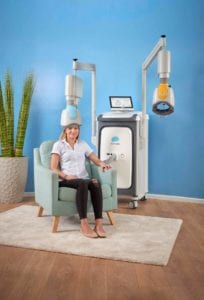
With many people battling mental health issues, a growing number of patients and practitioners seek to understand who is considered eligible for various treatment courses that offer greater symptom relief. BrainsWay’s Deep TMS treatment, or dTMS, has been shown to offer such relief and to be particularly effective for treatment-resistant individuals.
In order to be eligible for Deep TMS treatment, a person battling a mental health condition must meet the requirements defined by their insurance provider, which are informed by the specific FDA clearances for Deep TMS.
BrainsWay Deep TMS is indicated by the FDA for the treatment of depressive episodes in adult patients suffering from Major Depressive Disorder, who failed to achieve satisfactory improvement from previous antidepressant medication treatment in the current episode. (FDA 510(k) No. K122288)
Additionally, BrainsWay Deep TMS is indicated by the FDA as an intended adjunct treatment for adult patients suffering from Obsessive-Compulsive Disorder (OCD). (FDA De Novo No. DEN 170078)
Insurance providers in many cases apply further definition to these FDA clearances.
For example, many US insurance providers define Major Depressive Disorder (MDD) treatment coverage approval by the following criteria:
● The patient must be currently battling a depressive episode, with the episode’s duration documented with the coordinating dates.
● Within the current depressive episode, the patient must have undergone failed antidepressant trials. The name of the antidepressant, its dose, dates taken, and the reason why the treatment was abandoned should all be presented. The number of antidepressants and types of augmentation required differ by insurance plan.
● The patient must demonstrate that a trial of evidence-based psychotherapy was also ineffective. The duration and frequency of their visits must be documented, along with the modality of therapy and the name of the professional providing it.
● The patient must have a DSM diagnosis of F33.2 (Recurrent Depressive Disorder, Current Episode Severe Without Psychotic Symptoms) or F32.2 (Severe Depressive Episode Without Psychotic Symptoms). The severity of depression required, as measured by a clinical rating scale, differs by insurance plan.
● In cases where the patient had undergone previous TMS or ECT treatment, they will need to present the treatment’s details, including the first and last dates of treatment and the scores from the rating scales done at first and last sessions.
● The patient must also have no contraindications for TMS therapy. These include:
In the case of OCD, US insurance providers are currently evaluating coverage for Deep TMS treatment. Patients and physicians should submit to their prior authorization to insurers to qualify for single case agreements.
Contact your insurance provider to learn about eligibility for Deep TMS treatment under your specific plan.